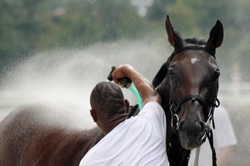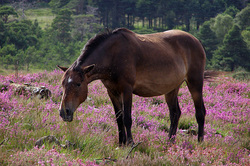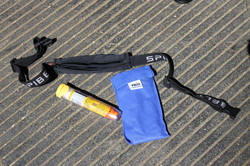
Did you know that there's a right way - and a wrong way - to hose your horse off after a ride? As summer temperatures soar, you'll want to be sure that you're cooling your horse off efficiently and effectively. Here's how.
Reduce Your Horse's Activity
Even during the summer heat, it's important to give your horse some time to recover from his workout. This means lessening his physical activity so that his heart and respiration rates have time to return to normal. Keep your horse moving, even though it's hot - walk him around the arena for a few minutes. During this time, encourage him to relax into a loose rein. If you dismount, then loosen his noseband and his girth to make him more comfortable and help him to breathe more easily.
Hose Off Your Horse
When you hose off your horse after a ride, you need to apply cool water to his body long enough so that it can reduce his body temperature. If you hose your horse off once and then scrape the water off, you may find that your horse's skin is cool and comfortable to the touch. If you wait a few minutes, though, your horse's skin will be hot to the touch. This is because the cool water has had time to sit against your horse's skin, and has been heated up. If you leave your horse like this, this heated water will only sit against your horse's skin, insulating it. This will slow your horse's cooling process, keeping him hot longer.
The best way to hose off a horse is to continuously apply cold water until his body has cooled down. Some riders prefer to hose the horse off, scrape off the water, hose the horse, scrape, repeat. Others prefer to continue hosing until the horse is cool - this can take upwards of ten minutes on particularly hot days when the horse has been heavily worked.
Encourage Your Horse To Drink
Rehydrating a horse is very important after a hot summer workout. Encourage your horse to drink as you cool him out. Provide him with fresh, clean, cool water. If you need to make the water more tempting, then add electrolytes, Gatorade, or apple juice to enhance its taste. Horse Quencher can also help encourage your horse to drink.
After a hard workout in the heat, make sure that you monitor your horse until he returns to his normal, comfortable self. Remember, sometimes it's just too hot to ride, especially when it's both hot and humid. You can always resume your training another - cooler - day.
Reduce Your Horse's Activity
Even during the summer heat, it's important to give your horse some time to recover from his workout. This means lessening his physical activity so that his heart and respiration rates have time to return to normal. Keep your horse moving, even though it's hot - walk him around the arena for a few minutes. During this time, encourage him to relax into a loose rein. If you dismount, then loosen his noseband and his girth to make him more comfortable and help him to breathe more easily.
Hose Off Your Horse
When you hose off your horse after a ride, you need to apply cool water to his body long enough so that it can reduce his body temperature. If you hose your horse off once and then scrape the water off, you may find that your horse's skin is cool and comfortable to the touch. If you wait a few minutes, though, your horse's skin will be hot to the touch. This is because the cool water has had time to sit against your horse's skin, and has been heated up. If you leave your horse like this, this heated water will only sit against your horse's skin, insulating it. This will slow your horse's cooling process, keeping him hot longer.
The best way to hose off a horse is to continuously apply cold water until his body has cooled down. Some riders prefer to hose the horse off, scrape off the water, hose the horse, scrape, repeat. Others prefer to continue hosing until the horse is cool - this can take upwards of ten minutes on particularly hot days when the horse has been heavily worked.
Encourage Your Horse To Drink
Rehydrating a horse is very important after a hot summer workout. Encourage your horse to drink as you cool him out. Provide him with fresh, clean, cool water. If you need to make the water more tempting, then add electrolytes, Gatorade, or apple juice to enhance its taste. Horse Quencher can also help encourage your horse to drink.
After a hard workout in the heat, make sure that you monitor your horse until he returns to his normal, comfortable self. Remember, sometimes it's just too hot to ride, especially when it's both hot and humid. You can always resume your training another - cooler - day.


 RSS Feed
RSS Feed
